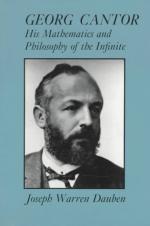|
This section contains 342 words (approx. 2 pages at 300 words per page) |
World of Scientific Discovery on Georg Cantor
Cantor thought of himself as artistically inclined. He is said to have voiced regrets that his father did not let him become a violinist. Cantor's family, on his mother's side, included renowned musicians, while his father was a successful businessman. It was within this ferment of vitality and creativity that Cantor grew up. He and his family moved to Germany when Cantor was 11 years old, and he remained there for the rest of his life.
Cantor had exceptional mathematical talent. In 1862 he began his university studies in Zurich, Switzerland, and then at the University of Berlin. There, he studied with Karl Weierstrass (1815-1897) who attracted a good many promising students to Berlin. In 1867, Cantor received his doctorate and then moved to Halle University to take on a teaching position there. Cantor, however, was poorly paid by the university, and he strove to obtain a better, more prestigious, teaching appointment in Berlin but was blocked by jealous professional rivals.
Cantor's chief mathematical pursuit was a deeper understanding of the concept of infinity. For instance, we think of the set of all integers (1, 2, 3, 4...) as being twice as large as the set of even numbers (2, 4, 6, 8...). Yet when we put these sets into a one-to-one correspondence, the set of even numbers has a member to match every member in the set of integers. Cantor realized that this meant there were different "orders" of infinity. In elaborating such ideas, Cantor created the forms and techniques of modern set theory. And though his work won recognition from abroad, intense and unreasonable opposition to Cantor's theories from Leopold Kronecker (1823-1891) in Germany effectively stifled Cantor's professional advancement. Part of the difficulty some scientists had with Cantor was his Platonistic adherence to metaphysics as a legitimate area of scientific enquiry. Cantor's writings on this subject may have tended to obscure the significance of his more rigorous, mathematical work. In 1884, Cantor broke under the strain of criticism. He spent much of the rest of his life in a state of severe depression. Cantor died in a mental hospital in 1918.
|
This section contains 342 words (approx. 2 pages at 300 words per page) |


